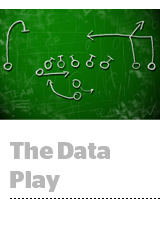 In the National Football League, the whole team has to know the same playbook for the plays to work.
In the National Football League, the whole team has to know the same playbook for the plays to work.
And the same is true for the NFL’s marketing group, which in 2017 began centralizing its audience data to improve team-level marketing and the value of league sponsorships.
“We’re building a data co-op, in a sense,” said Aaron Jones, the league’s director of club and international marketing.
The centralized data comes from a few important corporate partners, including Ticketmaster, the ticketing partner for the NFL and 30 of 32 NFL clubs, and Fanatics, an ecommerce and merchandise company in which the NFL invested $95 million a year ago. The league is also consolidating audience tags across NFL team websites.
In exchange, individual clubs will for the first time be able to leverage the NFL’s DMP, which is built on Adobe Audience Manager, Jones said.
The Green Bay Packers, for instance, allow a sponsor to take over the team’s photo page so that after a game the brand’s logo is splashed behind pictures of players. With the NFL’s Adobe DMP product, Jones said the Packers can now tag visitors to that page and create audience packages “that massively increase the value of the sponsorable asset.”
In another sign of its data-focused approach, the NFL has built data reciprocity into some of its sponsor deals.
The league partners with DirecTV on its “NFL Sunday Ticket” pay-TV package, and when DirecTV signs up a subscriber it must share the email address with the NFL. The NFL can’t send marketing to the email but can match to its DMP data and potentially improve that audience profile.
Barclays, a league sponsor, can use NFL audience data to improve targeting and frequency capping on campaigns, Jones said. And the video game company EA, which produces the “Madden NFL” video game series, uses NFL data to dynamically serve, say, New York Giants fans ads featuring Odell Beckham Jr. while New England Patriots supporters would see Tom Brady.
The increased data intake, ecommerce and merchandise sales in particular, have also helped the NFL attribute value to its marketing that otherwise would be lost. By connecting on the back end when someone makes a purchase, passing along email and transaction information, Jones said the league can tie campaigns to conversions even if ads don’t get much click-through.
The NFL and other sports marketers are trying to figure out exactly how valuable these data-driven sponsorship extensions are.
“Some think it’s negligible and some think it’s more valuable than the immediate sponsorship,” Jones said, but clubs aren’t waiting to put the tactics to use in deals of their own.
This post was syndicated from Ad Exchanger.

More Stories
Marketing Morsels: Hidden Valley Ranch, La-Z-Boy, Topps & More
Flashback: Jane Pauley and Deborah Norville Revisit Today’s 1989 Succession Drama
Ally Financial Revives ‘Banksgiving’ With A TikTok Twist